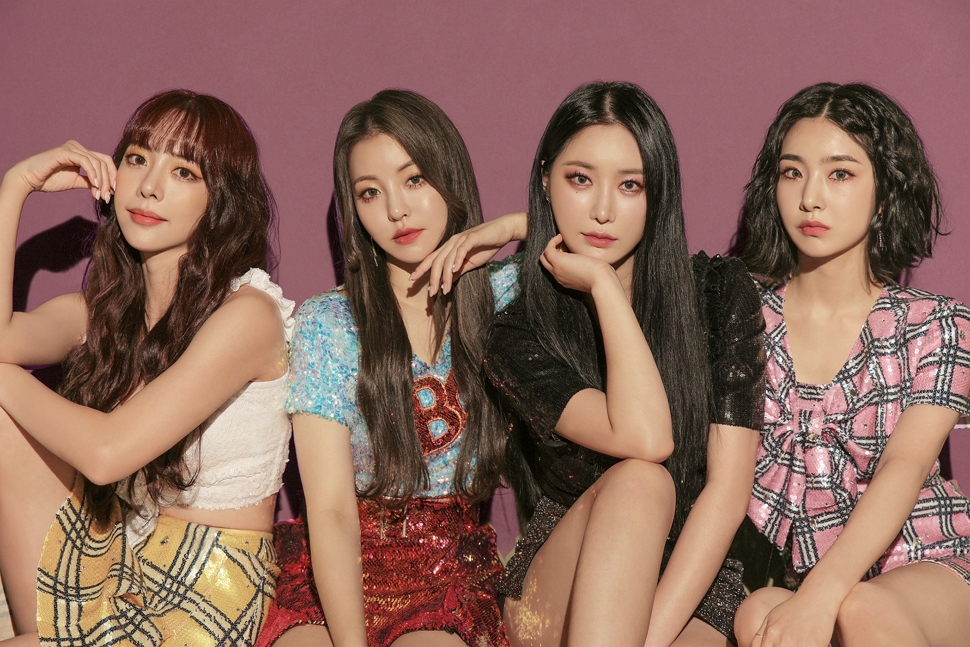Fan-driven campaign lifts unknown singers to overnight stardom
Date May 07, 2021
 K-pop girl group Brave Girls. Courtesy of Brave Entertainment
K-pop girl group Brave Girls. Courtesy of Brave Entertainment
●Fan-generated YouTube compilations are messing with K-Pop formulas.
●One girl group spent a decade going nowhere in K-pop world until a YouTube compilation of their heartfelt performances of one of their songs at army camps shot it to No. 1.
●Soldiers in their captive audiences dancing wildly and leaving positive comments on Brave Girls’ video garnered the group a second, or first, look.
SEOUL, South Korea -- Some stars are brought into the limelight years or decades after their debuts.
Girl group Brave Girls was on the verge of disbanding early this year after 10 years of being sidelined and falling into obscurity in the competitive K-pop scene. Their albums, along with efforts to start anew by reshuffling members throughout the decade, failed to bring them center stage, and they were soon reduced to performing in South Korean army bases – an undesirable gig due to the remote locations and low pay.
But the four-piece act became a sensation in South Korea in February after a video compilation featuring the title track from their 2017 album “Rollin’” gained traction.
The viral video, uploaded by the YouTuber Viditor, shows a series of the group’s past performances in front of soldiers along with screengrabs of witty comments left by soldiers in the comment section, such as “If we play this song during combat, we are sure to win.”
Images of conscripted soldiers chanting and dancing wildly to the upbeat dance track struck a chord with those in the service and the online community all over the country. It ultimately propelled the K-pop act into the spotlight. Since last month, “Rollin’” has been all the rage as it sat atop multiple local music streaming charts and swept Billboard’s K-pop 100 chart.
Brave Girls’ belated success is an extreme example of a sleeper hit, and is known as the “yeokjuhaeng” phenomenon in the K-pop scene, which literally means “wrong-way driving.” It refers to a song or a group that demonstrates an unusual characteristic of climbing to the top of the music charts following months and sometimes years of obscurity.
Their resurgence is similar to that of girl group EXID, whose 2012 song “Up & Down” became popular two years later when a fan video of their performance suddenly went viral. And last year, K-pop star Rain saw his 2017 track, “Gang,” which initially underperformed due to its cringe-inducing and anachronistic quality, rise to the top after a wave of memes and parodies popped up online.
Such a trend where fans boost the popularity of singers through YouTube is a reversal of the typical K-pop formula, where talent agencies train and launch musical groups and take charge of media promotions.
Some attribute this phenomenon to changing consumption patterns of music listeners on YouTube and other streaming social media. Music videos and performance clips are now available to view anytime online with no restrictions in terms of broadcast time or platform. This can lead users to rediscover and share once-obscure older content, tearing down boundaries between past and present.
Participatory, fan-driven campaigns also contribute to the popularity of K-pop content, especially among the genre’s main consumers – millennials and Gen Z. Lee Gyu-tag, assistant professor of cultural anthropology at George Mason University Korea, pointed out that these generations are known for their proactive cultural consumption as they are used to not only watching the content but also voluntarily producing, editing, uploading and discussing their own versions such as dance covers, memes and reaction videos. Such activities have become crucial for K-pop, which relies heavily on online-based fandom for marketing and promotion.
Kang Woo-sung, author of “The K-pop Dictionary” and “Korean Culture Dictionary,” stated that the previously unilateral process where pop culture content created by the agencies was passively consumed by fans has undergone a significant change through new media channels. Fan’s voices and preferences are now reflected in the content production and marketing phase.
And in Korea, culture critic Kim Hern-sik said, the celebrities’ ascendance beyond K-pop clusters can affect not just certain groups of fans, but areas of society beyond the entertainment scene as they start exercising economic influence by appearing in multiple product advertisements. When Rain’s “Gang” gained popularity last year, he became the model for the well-known shrimp snack “Saeukkang.” After the manufacturer, Nongshim, played up the similarity between his song title and “kkang,” sales of the snack reportedly jumped 30 percent from the previous year. Less than a month after their meteoric rise, Brave Girls members have appeared, or are scheduled to be, in game, makeup and food product ads.

The Ministry of Culture, Sports and Tourism's "Korea Here & Now" work can be used under the condition of "Public Nuri Type 1 (Source Indication)."




